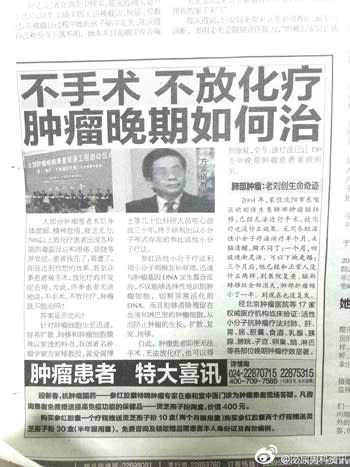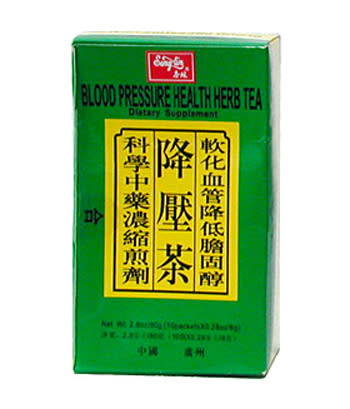How Crowdsourcing Can Stop False Medical Ads from Killing Chinese Grandparents

This FMA claims it can cure cancer without surgery or chemotherapy. “This is guerilla warfare.” That’s how Dr. Stanley Li, founder of online Chinese medical website DXY.cn, described his fight against false medical advertisements, or FMAs. Li says these fake treatments and medicines are a serious problem in China because they delay professional diagnosis and treatment of serious diseases and other medical problems. They are advertised in newspapers, on TV, and online. In one famous case that brought the issue to light, a 32-year-old woman died of lupus after taking ineffective drugs advertised in a fake ad. Professional treatment of lupus is 95 percent effective. During his TEDx talk in Beijing earlier this month, Li showed examples of medicines that claimed to remedy any number of ailments. For medical professionals like Li, they are easy to spot: tea, socks, wristbands, herbal pills, and pillows that cure hypertension, diabetes, and cancer, among many other things. Li says these advertisements use “many superstitions, exaggerations, or abuse of experts named – even Nobel Prize winners.” The claims might seem ridiculous, but Li says 15 to 30 million Chinese buy products advertised in FMAs every year. Of the 300-400 billion RMB (~$50 billion) spent on medical advertising every year in China, he estimates about 60 billion ($10 billion) is for fake treatments. They often prey on the elderly. Every medical advertisement requires a license number in the ad, but Li says they often shrink the number to a font so small it can barely be made out. “It is very hard to distinguish, especially for senior Chinese people,” says Li. Many FMAs don’t even look like advertisements, rather posing as news stories. Every so often, the government states it will crack down on the hundreds of companies that use FMAs, but Li says the punishment is often no more than a small fine and a wag of the finger. By the end of 2012, some 534 traditional Chinese medical institutions had been warned and fined, and 324 suspended from practice. Only 13 had their licenses revoked. The cure Frustrated with this, he partnered with three other prominent medical experts: Eric Chong, secretary-general of the China Hospital Association, Liao Xinbo, deputy director of Guangdong’s Health Department, and Yu Keyi, a professor at PUMCH. Together, they came up with a way to give every citizen the power to “win the war on FMA” from their smartphones. Since January, they’ve built a community on Sina Weibo and WeChat to crowdsource images of FMAs wherever they appear. For example, one of DXY.cn’s 200,000 Weibo fans need only take and post a picture of a suspected fake ad with a tag. DXY.cn will see the tag, examine the photo, confirm it is an FMA, and then expose it for all of its followers to see. Li says Weibo users can use it as a reference to alert their parents, grandparents, or other loved-ones. He says they’ve accumulated more than 500 fakes so far. Li admits Weibo can sometimes be too fragmented to be used as reference material, so he and his team are now working on an FMA database. Anyone will soon be able to access it online to contribute or browse. In addition to exposing the companies and false treatments, the database will also include the TV station, newspaper, or website the FMA was located on. “The media partners are not innocent,” says Li.

This tea, which Dr. Li cited as an FMA, says it can lower blood pressure. TCM or BS? Biased against TCM? As you might have guessed, Li’s vendetta against FMA’s disproportionately affects advertisements claiming to be traditional Chinese medicine, or TCM, rather than Western pharmaceuticals. Li says most TCM doesn’t have evidence or clinical trial data to show its effectiveness. Although Li and his team only target advertisements, the line between a false treatment and skepticism toward TCM is a blurry one. “Products advertised in FMAs are an extension of TCM. They make themselves look like drugs or an alternative medicine,” says Li. “All alternative therapies, they don’t have any effects. They just have some placebo effects.” In reality, FMAs selling “Western” medicine could be just as common, but not as easy to spot. For FMAs branded as TCM, the lie is usually so obvious that it takes little investigation to confirm. A credible source You might be asking, “Who or what is DXY.cn to tell me what is or isn’t real?” The website, also called “Purple Lilac” in English, is a portal and forum mostly for people with medical or pharmaceutical backgrounds to share their experience. It was started back in 2002 to introduce PubMed to China. Today DXY.cn helps recruit medical students and doctors, advertise and sell pharmaceuticals, and provide continued medical education. Despite his professional resume, Li joked his own parents are often reluctant to take his medical advice. He says this is a common cultural barrier in China. Parents want to retain their status as family authority figures. A son or daughter recognizing a fake medical ad is one thing, but convincing his or her parents could be another hurdle entirely. “More and more parents, especially in cities, are more open to suggestions from their children,” says Li. “This is slowly changing. It takes time.” (Editing by Steven Millward)
The post How Crowdsourcing Can Stop False Medical Ads from Killing Chinese Grandparents appeared first on Tech in Asia.


